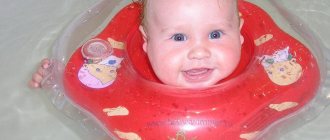The benefits of a proper daily routine
Pediatricians are sure that a certain regimen is important for the baby:
- the baby develops better;
- the baby grows up more balanced and is less capricious;
- the day does not turn into one “endless” feeding;
- the small ventricle has time to digest breast milk;
- sufficient sleep prevents fatigue;
- there is time for mandatory walks. Everyone knows about the benefits of fresh air;
- parents find time to communicate with the little man, bathing, massage, hardening procedures;
- Mom gets the opportunity to relax a little, pay attention to herself and other family members.
Free mode or clear routine
This issue is actively discussed on forums and in the medical community. Several decades ago there were certain rules that took little into account the interests of the baby. Doctors believed that feeding should be carried out strictly according to the clock, despite the crying of a hungry child and the excitement of the young mother about this.
Over time, ideas have changed: many pediatricians recommended feeding the baby on demand and completely subordinating life to the interests of the newborn. The mother was very tired, the child did not always eat actively, and the feeding process dragged on for an hour or more.
Find out more about how to treat sore throat in children at home.
Methods for treating sinusitis in a child with folk remedies are described at this address.
Both options are extremes that have their drawbacks:
- in the first case, the newborn cries because he wants to eat, but the next feeding is still half an hour away. Mom worries with a heavy heart, but does nothing, because according to the rules, you cannot feed the baby ahead of time. The breasts often become “filled,” congestion may develop, and pain may be felt. The baby eats greedily, hurries, swallows air, and his tummy swells. Everyone suffers;
- in free mode, the mother turns into a “machine for producing milk”, she becomes very tired, and it is difficult for a woman to allocate the minimum necessary time for rest. Feeding often takes a long time with few breaks. This leads to health problems, irritation, and often a decrease in milk production due to nervous tension.
Now the controversy has subsided. Finally, a “golden mean” was found, a regime was drawn up that suited the newborn and young parents. Most pediatricians are of the same opinion.
Listen to the recommendations of doctors:
- feed the baby on demand, 6–8 times a day plus 1–2 times at night;
- Feed at approximately the same time. If the baby gets hungry a little earlier, try to “stretch out” for another 15–20 minutes, talk kindly to the baby, distract him;
- be sure to walk with the baby;
- in good weather, sleep is recommended during daily walks in the fresh air;
- allocate time for hygiene procedures. Air baths and massage are useful. Be sure to bathe your baby before going to bed;
- take into account the interests of the child, do not turn parenting into a daily struggle with the baby;
- try to stick to a routine: the quality of care for the newborn will improve, and parents will have time to relax.
How much should babies sleep at 8 months?
Sleep pattern in children aged 8 months during the day and night
- For a baby who begins to move actively, learns to stand up and crawl, at this age 15 hours of sleep is enough. During the rest period, he will grow, his energy and strength will be replenished.
- The child will be able to cheerfully play and explore the world around him for 9 hours.
Sleep duration in children aged eight months
- Some children at 8 months adhere to the old routine - sleep soundly during the day 2 times for 2.5 hours. And other toddlers can sleep for 3-4 hours at a time.
- In total, kids should spend 5 hours on daytime rest, and 10 hours on nighttime rest.
Why does my child sleep poorly, restlessly, or not sleep at all during the day/night?
Sleep disturbances often occur for certain reasons.
- It is difficult for him to breathe due to stuffiness or high humidity in the room.
- It's hot or cold to sleep.
- Sounds from the outside world or insects (in summer) interfere.
- Tummy hurts due to complementary feeding.
- It is uncomfortable to sleep on a pillow or a new mattress.
An 8-month-old baby constantly sleeps: why?
The cause of long sleep can be a disease inside the child’s body. You should contact your pediatrician.
And an eight-month-old baby may become overtired, because she now spends so much energy!
Features of caring for a baby in the first month of life
What is the daily routine of a newborn? Main stages:
- dream. The optimal duration in the first month is about 18–20 hours;
- nutrition. Number of feedings: 6–8 per day, if required, apply to the baby’s breast once or twice more at night;
- wakefulness – from 4 to 6 hours per day. Communicate with the baby, talk gently, give massage, give air baths. The newborn still reacts weakly to all your actions, but he gets used to the timbre of his voice, feels protected and comfortable. Scientists have proven that children who lack affection and communication develop worse, grow aggressive and withdrawn;
- walks in the open air. Duration - depending on the season, air temperature, state of health (if you are sick, the duration of walks is shorter). During the warm season, it is recommended to sleep at least once while staying in the fresh air;
- hygiene procedures. Morning toilet (washing, cleaning the ears, nose, washing the eyes), daily care of the umbilical wound, washing after defecation/urination. The baby is bathed 30-40 minutes before bedtime.
How much should a 10 month old baby sleep day and night?
How long should a ten month old baby sleep at night and during the day?
- A 10-month-old toddler should sleep at least 14 hours a day. The rest time is reduced by one hour, but it is enough for the baby to replenish its energy supply.
- And the baby has been awake for 9-10 hours.
Duration of sleep in a child aged ten months
- A child needs 10 hours to rest at night. Moreover, note that at this age you no longer need to get up to him in the dark to feed.
- Daytime sleep time is 4 hours. It can be divided into 2 deep sleeps of 2 hours each.
Why can't a child of ten months of age sleep during the day or at night?
There are many reasons for poor sleep.
- The child may be disturbed by voices, noise, or the sounds of the TV.
- Stuffy room or high humidity.
- A sleeping place that is inconvenient for a baby to sleep, for example, a wide parent’s bed.
- Illnesses, especially colic in the abdomen, can be bothersome.
- Overwork.
- Character. A child can express himself by demanding attention from his mother.
Why does a baby sleep a lot at ten months of age?
If your baby sleeps a couple of hours more than expected, doctors advise not to panic.
And if a child sleeps for a very long time and refuses to eat, he should be given special attention. Perhaps something is bothering him. He is ill? Examine the baby yourself or contact your pediatrician!
Sample daily routine for a baby
Focus on the duration of wakefulness and sleep, adjust the regime taking into account the needs of your baby:
- at 6 o’clock the baby wakes up, hygiene procedures are carried out;
- first feeding at 6.30, subsequent feedings at intervals of 3 hours or a little less, depending on the child’s needs;
- After eating, the baby stays awake, then sleeps until the next feeding. Until 21.00, the child should rest 4 times for about two hours;
- Before the night's rest, bathing is carried out. At 21–22 hours after feeding, the baby falls asleep. At night, most newborns require the breast once or twice.
Advice! In the evening, do not disturb the baby, play with him, talk, but too active movements are prohibited. Before the night's rest, the baby should calm down. Bathing is carried out not only for hygienic purposes, but also for relaxation and better rest.
Don't forget about gymnastics
Approximate gymnastics for a baby 2 and 3 months old:
Exercise “sliding steps.
When the baby is lying on his back, take him by the lower part of the shin and smoothly straighten one leg, as if sliding his foot on a sofa or changing table, repeat with the second leg.
Swimmer exercise.
It is enough to do it once a day. Place the baby on his stomach and, holding his legs with one hand, bring the other under his chest and lift him above the surface.
Swinging on a ball.
Place the baby with his stomach on a rubber ball and rock him, adding push-off of the baby’s feet from the ground.
Exercise “walking while lying down.
Take the legs of the baby lying on his back and repeat the walking movements, while pressing his knees to his tummy, which will help get rid of gas.
Basic stages of caring for a newborn
Parents must provide the baby with maximum comfort. The correct regimen is important for the health and development of the newborn.
Provide adequate rest, adequate nutrition, and a comfortable level of communication. Hygiene procedures and attention to the health of the baby are required.
Dream
Take note:
- the newborn sleeps most of the day, wakes up to eat;
- The optimal duration of rest at night is from 8 to 9 hours. Daytime sleep is divided into several periods. The total duration of rest is 7–8 hours;
- During the first walk, the baby also sleeps. Many mothers know that in the fresh air, sleep is always sound and calm;
- Make sure your baby is not overtired. Staying awake, not counting feeding, should last about an hour;
- If the baby sleeps for a long time during the day, carefully wake him up, otherwise over time the baby will confuse day with night. In such a situation, it takes a lot of time to return to normal;
- choose a high-quality, breathable diaper that fits properly. Don’t be lazy, change this useful device once again: dirty diapers are the cause of diaper rash, skin diseases, and genital organs;
- Before going to bed, be sure to ventilate the room, create the optimal temperature: +20...+22 degrees. Heat does not contribute to normal sleep and provokes heat rash in newborns;
- If the baby does not fall asleep for a long time and cries, try feeding him a little. Perhaps the baby cannot sleep due to hunger. Often the cause of disorders is various diseases. Be sure to consult your pediatrician.
Nutrition
Recommendations for feeding regimen for newborns:
- feed the baby “on demand”, try to develop the habit of eating at approximately the same time in the newborn;
- During the first few days, the newborn gets used to new conditions, and the feeding schedule is often disrupted. Cast aside doubts: the baby will grow up a little, the stomach will get stronger, it will be easier to establish a daily routine;
- Before eating, be sure to place the baby on its tummy. After feeding, hold the baby upright to allow air to escape. A simple technique helps you regurgitate excess milk. Another plus is that colic develops less often;
- do not overfeed the baby: overeating creates problems for a poorly developed digestive system, provokes colic, bloating, and moodiness;
- At first, suitable food is only breast milk or special infant formula. If your mother does not have milk, choose substitutes from well-known manufacturers, with the obligatory mark “for newborns”;
- the number of feedings per day is at least six. Many babies wake up at night to eat, especially if their mother’s milk has low fat content. If the baby wakes up more often and sucks greedily, think about how to change the diet and make breast milk more nutritious.
How to properly treat chickenpox in children? We have the answer!
For a menu for pancreatitis of the pancreas in a child, see this article.
Follow the link https://razvitie-malysha.com/zdorovie/bolezni/allergii/pishevaja.html and read about the symptoms and treatment of food allergies in infants.
Listen to these recommendations:
- Don’t hold your baby to your breast all day, be sure to put him in his crib. Create a cozy “nest” of a suitable size in which the baby will feel protected;
- at one time the baby should receive 50–90 ml of breast milk. This is an approximate indicator that varies depending on the individual characteristics of the baby. Weight gain is a guideline that shows whether the newborn is getting enough food. It is important to take into account the baby’s health status and activity.
Important! A nursing mother will have to give up some foods that impair the quality of breast milk. Citrus fruits, honey, chocolate, coffee, tomatoes, strawberries, and sea fish are prohibited. Do not consume full-fat cow's milk, hard cheese, drinks with dyes and preservatives, alcohol, or fast food. Violation of the rules provokes diathesis, food allergies in infants.
Walks
Recommendations:
- for the first walk in summer the air should warm up to +20 degrees. Start with a quarter of an hour, add 5 minutes every day;
- if the baby was born in late autumn or winter, take the baby out for 10 minutes for the first time at a temperature not lower than -3 degrees. Increase your time outside gradually; do not walk with your newborn in severe frost;
- After a month, increase your exposure to air to 45 minutes. In summer, walk twice a day, in winter – once, for about half an hour;
- dress your newborn according to the weather, do not wrap it up too much. If after a walk the feet and palms are warm, it means the child is not cold.
Be careful in damp, windy weather: your baby can easily catch a cold. Under such weather conditions, there are pathogenic bacteria in the air that prefer humid conditions, temperatures just above zero degrees.
Hygiene procedures
Mandatory activities:
- Lubricate the umbilical wound with a 3% hydrogen peroxide solution twice a day. Be sure to apply brilliant green to the wound after disinfection: treatment prevents infection. When swimming, do not rub this area;
- daily morning toilet: washing with warm water (necessarily boiled). Start with +37 degrees, gradually increase the water temperature to +25 degrees;
- treat the eyes with a cotton pad;
- wipe the outside of the spout, carefully clean the inside with a rolled cotton swab;
- Clean your ears twice a week. Do not force the cotton wool inside, otherwise wax will accumulate in the depths of the ear canal.
Now you know what the baby’s approximate regimen is in the first month. Pay attention to the baby, satisfy the need for food, sleep, remember about psycho-emotional development. Monitor the health of the newborn, gradually harden it. Consult your local pediatrician, but be sure to take into account the individual characteristics of your child.
Video about baby's daily routine:
Tip #10
If, despite everything, your child refuses to fall asleep at the “supposed” time, try changing your regular schedule and start putting him to bed an hour later.
Two to three weeks. This is the average amount of time required to accustom a child to a constant regimen. Yes, this may not be easy. Yes, it will require discipline and patience on your part. But believe me: this is a great investment in the future. If you know exactly what time your child falls asleep and wakes up, it will be more convenient for you to plan your activities, and you will finally be able to devote time to yourself. In addition, this will save your already frayed nerves from daily and nightly tests of whims. So, gather your strength and start transitioning your child to a permanent routine. The results will not take long to arrive. About the author: Buzunov Roman Vyacheslavovich President of the Association of Somnologists, Head of the Department of Sleep Medicine, Federal State Budgetary Institution Clinical Sanatorium Barvikha, Administration of the President of the Russian Federation, Honored Doctor of the Russian Federation, Professor, Doctor of Medical Sciences. Photo - Lori's photo bank











